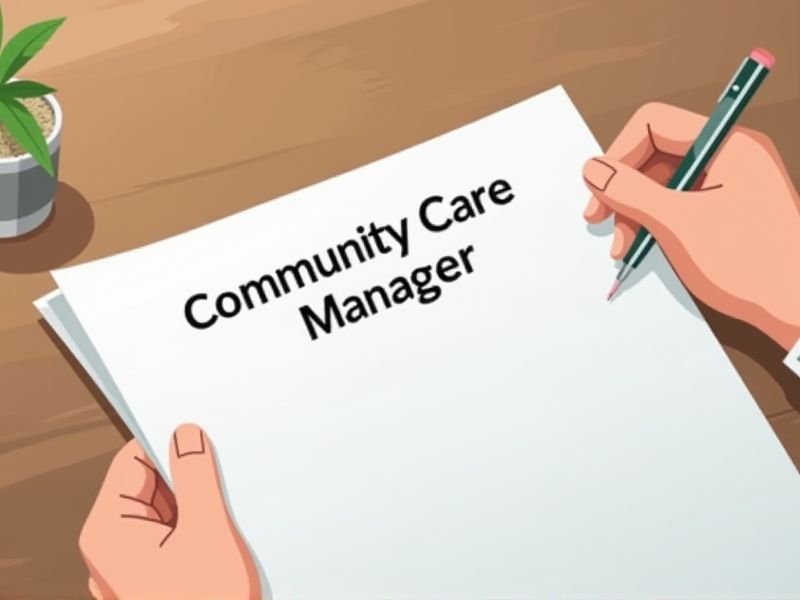
Community Care Managers oversee operations and directly impact client well-being, making specialized training crucial. Certifications ensure managers have the knowledge to navigate complex healthcare regulations and provide exceptional care. These credentials enhance leadership skills, improving team coordination and resource allocation. Important certifications for a Community Care Manager include those related to healthcare administration, social work, and patient advocacy.
Certified Case Manager (CCM)
Certified Case Managers possess specialized training, enhancing their ability to coordinate comprehensive care plans efficiently. Their qualifications ensure adherence to best practices, improving patient outcomes in community settings. The complexity of healthcare systems demands that community care managers navigate intricate networks, where CCMs bring crucial expertise. Without CCMs, community care may face increased inefficiencies and fragmented services.
Certified Community Health Worker (CCHW)
Certified Community Health Workers (CCHWs) can bridge the gap between healthcare providers and the community, enhancing communication and trust. They have a deep understanding of the cultural and social factors influencing health behaviors, aiding in tailored interventions. CCHWs track health outcomes and identify trends, enabling Community Care Managers to adapt strategies effectively. Their presence often leads to increased patient engagement and improved adherence to care plans.
Certified Aging Life Care Professional (CALCP)
The presence of a Certified Aging Life Care Professional in community care management ensures personalized care plans that address the unique needs of aging individuals. Their expertise in navigating the complex healthcare and social service systems can significantly enhance access to appropriate resources. CALCPs bring a comprehensive understanding of age-related challenges, leading to improved quality of life for seniors. Their involvement facilitates better communication among caregivers, families, and medical professionals, fostering a cohesive care approach.
Certified Patient Care Coordinator (CPCC)
A Certified Patient Care Coordinator (CPCC) improves the efficiency of community care management by ensuring seamless communication between patients and healthcare providers. They provide consistent follow-ups and personalized care plans, leading to improved patient outcomes. Their certification ensures a standardized set of skills and competencies, which increases trust in patient management. As healthcare systems evolve, CPCCs play a critical role in integrating care to reduce hospital readmissions and enhance community-based care.
Certified Dementia Practitioner (CDP)
A Certified Dementia Practitioner (CDP) is essential for a Community Care Manager because it ensures that they have specialized training to handle the complexities of dementia care. This qualification equips managers with the skills to create supportive environments, necessary for maintaining the well-being of individuals with dementia. With CDP certification, care managers can implement evidence-based practices that improve communication and reduce behavioral challenges. Ultimately, possessing this expertise enhances the overall quality of care within the community setting.
Certified Hospice and Palliative Care Manager (CHPCM)
The role of a Certified Hospice and Palliative Care Manager (CHPCM) ensures that community care managers are equipped with specialized knowledge to address the complex needs of patients facing terminal illnesses. This certification provides managers with skills in pain management and emotional support, which are crucial for enhancing the quality of life for patients with severe health conditions. CHPCM certification also enables managers to effectively coordinate between multidisciplinary teams, ensuring that care plans are comprehensive and patient-centered. Certified managers contribute to improved communication and decision-making, reducing stress for both patients and their families during challenging times.
Certified Nurse Manager and Leader (CNML)
The Certified Nurse Manager and Leader (CNML) credential ensures that a community care manager possesses the essential skills for effective healthcare delivery and team leadership. This certification equips managers with strategies to improve patient care quality, which directly impacts community health outcomes. In community settings, CNML-trained managers can efficiently allocate resources, leading to better utilization of services and reduced operational costs. The credential fosters a standardized approach to leadership, promoting consistency and reliability across community care frameworks.
Certified Professional in Healthcare Quality (CPHQ)
A Certified Professional in Healthcare Quality (CPHQ) equips a Community Care Manager with essential skills to uphold and enhance clinical standards and patient safety. This certification ensures the manager stays informed about the latest industry regulations, directly influencing compliance and quality outcomes. CPHQ training improves communication efficiencies between teams, fostering a cohesive effort in delivering patient-centered care. In attaining this credential, managers are empowered to implement data-driven decisions that lead to optimized resource use and reduced healthcare costs.
Project Management Professional (PMP)
Community Care Managers deal with complex timelines and resources, similar to project managers, making PMP skills valuable for effective coordination. The PMP certification enhances managers' ability to strategically plan and execute initiatives, resulting in improved community health outcomes. With PMP skills, Community Care Managers can better manage budgets and ensure that financial resources are optimally allocated. PMP-certified managers bring proven risk management techniques, crucial for mitigating potential setbacks in community health programs.
Certified Aging in Place Specialist (CAPS)
A Certified Aging in Place Specialist (CAPS) is essential for a Community Care Manager to effectively address the increasing demand for aging-friendly home modifications and accessibility solutions. They provide specialized knowledge in creating safe and adaptable living environments, which is critical as the population of older adults continues to grow. This expertise enhances the care manager's ability to recommend modifications that support individuals' independence and reduce the risk of injuries. Without a CAPS, Community Care Managers may lack the technical insight needed to evaluate and implement appropriate adjustments for clients aging in place.
Summary
By obtaining certifications, you as a Community Care Manager can enhance your professional credibility. This leads to improved trust and respect from both colleagues and clients. The certification also equips you with specialized knowledge, increasing efficiency in managing community care programs. In turn, the organization may experience higher client satisfaction and retention, reflecting positively on your leadership.
